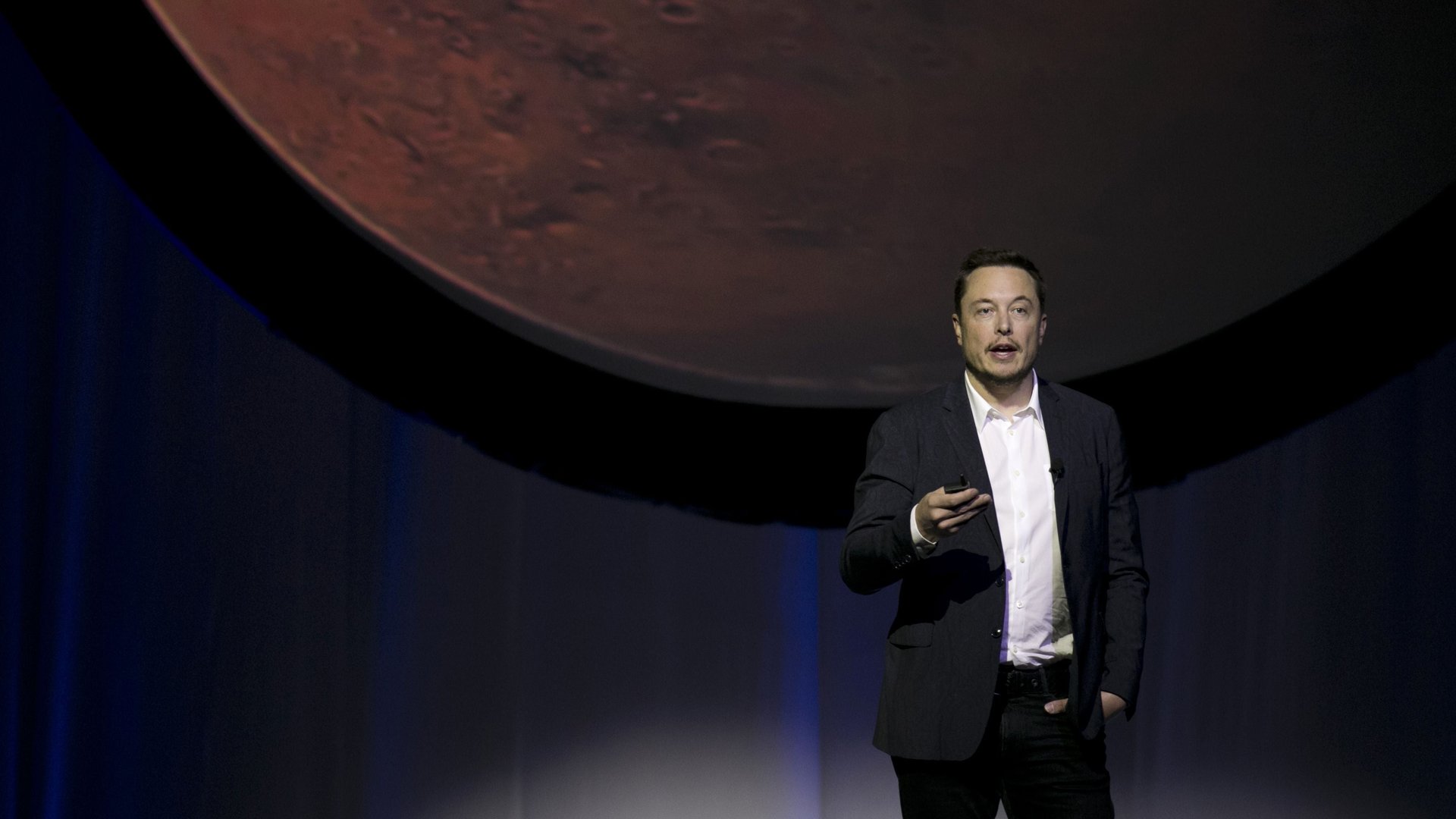Elon Musk believes we can live on Mars, but there’s “no possibility” Trump will retract immigration order
Elon Musk, the CEO of Tesla and SpaceX, does not believe in the concept of impossible. He has proposed a solar-powered transit system that would travel between San Francisco and Los Angeles in less than 30 minutes, and plans to make humans a “multi-planet species” by helping them colonize Mars.


Elon Musk, the CEO of Tesla and SpaceX, does not believe in the concept of impossible. He has proposed a solar-powered transit system that would travel between San Francisco and Los Angeles in less than 30 minutes, and plans to make humans a “multi-planet species” by helping them colonize Mars.
But when it comes to US president Donald Trump’s recent executive order on immigration and refugees, Musk sees an inevitable roadblock, writing on Twitter that “There is no possibility of retraction, but there is a possibility of modification. It’s just a non-zero possibility.”
The executive order, which Trump signed on Jan. 27, indefinitely blocks Syrian refugees from entering the United States, blocks refugees from all other nations for four months, and places a 90-day ban on entry to the country from seven Muslim-majority nations.
Protests against the executive order erupted at major US airports over the weekend, and many Silicon Valley executives publicly condemned it. Starbucks in response vowed to hire 10,000 refugees worldwide over the next five years.
Musk, who joined other business executives on a Trump advisory council in December, asked on Twitter for thoughts about specific amendments to the immigration order. The SpaceX and Tesla founder wrote that he “will seek advisory council consensus & present to President.” Musk has previously criticized the order, writing that “The blanket entry ban on citizens from certain primarily Muslim countries is not the best way to address the country’s challenges.”
So why is it that revoking an executive order seems more difficult to Musk than landing on Mars?
Presidents can revoke an executive order, and they frequently do revoke executive orders made by their predecessors. But presidents typically do not supersede their own executive orders, and many policy experts agree that Trump is similarly unlikely to do so for political reasons. “This early on, to admit that you’ve made such a huge mistake would be very politically damaging,” says Alvin Tillery, an associate professor of political science at Northwestern University. “And I think that the response with protests and so on, it would just give further fodder to people who want to challenge [Trump’s] policy positions.”
Other than an overriding executive order, there are several ways for an executive order to change. One way Trump’s immigration order has already evolved is through the interpretation by the agency it instructs. For example, the US Department of Homeland Security issued an order essentially exempting legal permanent US residents from the ban. According to William Howell, a professor of American politics at the University of Chicago, who has written extensively on executive power, this is not a normal development. “In the aftermath of most executive orders, if not silence, there is at least broad acquiesensce,” he says “Presidents usually vet them, they talk to key political actors, get their input. …The subjects that would require clarification, whoever writes the order is usually aware of them and provides clarity in order.”
The ban currently applies to dual citizens of the seven countries named in the executive order, which could be altered in subsequent orders. ”In general, I have the impression that Trump is treating this executive order as a kind of opening offer in a negotiation, a deliberately overstated position from which he will bargain down to an outcome he likes,” says Howard Schweber, a professor of political science and legal studies at the University of Wisconsin-Madison.
The order also could be shut down by a legal challenge, though historically courts have favored presidents in such cases. Congress, meanwhile, can expect a presidential veto on any bill to repeal it. ACLU lawyer Lee Gelernt told NPR that the civil-rights group plans to argue, in its challenge to the order, that—among other things—it is not essential to national security, an area over which the president has broad authority.
Trump’s executive order gives preference to refugees who belong to a religious minority in their countries and have been persecuted for belonging to that religion. He specified an interview that Christians would be given priority. Constitutional scholars see this clause as another potential avenue for a legal challenge. “The extent to which he’s created a religious test, everything I know about the Supreme Court suggests it would be found in violation of the constitution,” says Tillery.
Update: Musk clarified his position to Quartz on Jan. 30 (and we’ve updated our headline accordingly). “I said it won’t be retracted (ie withdrawn by Pres),” he wrote on Twitter. “It may be revoked by judicial or legislative means.” We are still going to Mars.